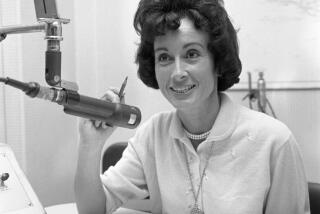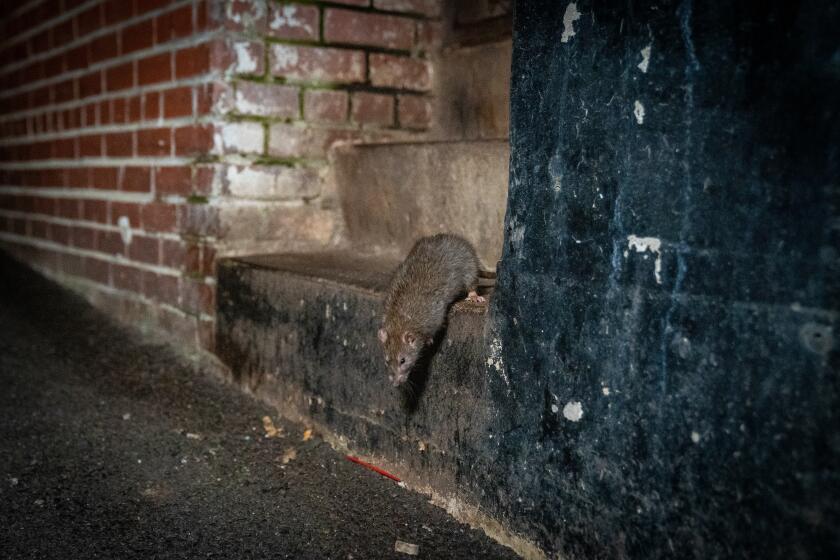Anita Roberts, 66; Researcher Shed Light on Cancer, Healing
- Share via
WASHINGTON — Anita B. Roberts, a highly regarded researcher whose work illuminated how cancer progresses and wounds heal, died of gastric cancer May 26 at her home in Bethesda, Md. She was 66.
Roberts was most recently chief of the Laboratory of Cell Regulation and Carcinogenesis at the National Cancer Institute.
For the record:
12:00 a.m. June 2, 2006 For The Record
Los Angeles Times Tuesday May 30, 2006 Home Edition Main News Part A Page 2 National Desk 0 inches; 22 words Type of Material: Correction
Roberts obituary: An obituary for cancer researcher Anita B. Roberts in Sunday’s California section stated her age as 66. She was 64.
For The Record
Los Angeles Times Friday June 02, 2006 Home Edition Main News Part A Page 2 National Desk 1 inches; 42 words Type of Material: Correction
Roberts obituary: A Washington Post obituary of cancer researcher Anita B. Roberts in Sunday’s California section stated that quotes from Roberts about her own experience with cancer were first published in the journal Cancer Research. They were published in the magazine CR.
She and her research partner, Dr. Michael Sporn of Dartmouth Medical School, won the 2005 Komen Foundation Brinker Award for Scientific Distinction for their work on molecules that can turn a healthy cell cancerous.
Roberts also won the 2005 Award for Excellence in Science bestowed by the Federation of American Societies for Experimental Biology. She was honored with membership in the American Academy of Arts and Sciences.
Those accolades seemed little comfort two years ago when Roberts’ gastric cancer was diagnosed.
“When I was first diagnosed with this cancer, I was so angry about my research,” she told the journal Cancer Research in this spring’s issue. “I thought: ‘What have I been doing for 25 years? Who cares what compound binds to what piece of DNA?’ That lasted about a week. Then I realized we now have drugs based on what we understand from our basic research.”
Her work focused on a protein known as TGF-beta, or transforming growth factor beta, a messenger molecule integral to the activities of the cell cycle. She and Sporn found that it had a role in autoimmune diseases, fibrogenesis, carcinogenesis and wound healing, and their research formed the basis of new approaches in breast cancer therapy.
“Cancer is not just a disease of a tumor cell,” she told Cancer Research. “It’s a disease of where the tumor cell is and what the surrounding cells are telling it. That’s what makes cancer similar to a wound that doesn’t heal, and that’s why we’re also interested in wound healing.”
Roberts was a warm, enthusiastic and upbeat supervisor who figured out how to balance work and family not just for herself but for her colleagues as well, said Dr. Lalage Wakefield, who worked with her for 25 years. She kept the 17 people in her lab happy “through the force of her personality,” Wakefield said, describing a clear-eyed and supportive scientist.
“She never lost sight of the personal component in all this. Work is done by people, and it needs to be done in a cooperative fashion,” Wakefield said.
Roberts, a Pittsburgh native, graduated from Oberlin College in Ohio and received a doctoral degree in biochemistry from the University of Wisconsin. She did postdoctoral work as a National Institutes of Health fellow at Wisconsin and Harvard Medical School before becoming a staff chemist at the Aerospace Research Applications Center in Bloomington, Ind. She then taught chemistry at Indiana University.
She joined the National Cancer Institute in 1976, and by 1990 had risen to deputy chief of the Laboratory of Cell Regulation and Carcinogenesis, then to acting chief and, in 1995, to chief, a position she held until two years ago.
After devoting her professional life to research, Roberts told Cancer Research, “I cannot listen to a seminar on cancer now without making it into my cancer,” wondering how she could become one of the patients who responded well to one treatment or another. “So, yes, I take it all very personally now.
“Research takes a long, long time,” she said. “I know the public is always looking for a magic bullet. They want you to say, ‘This does that.’ But our own biology is incredibly complex, so ‘this’ doesn’t always do ‘that.’
“As basic scientists, we’re all driven by our excitement in finding answers. We hope it ends up as something that becomes therapy. But that doesn’t happen unless you have a basic understanding of the process. And that’s what my work is all about.”
Survivors include her husband of 41 years, Robert Roberts; two children; five grandchildren; and a sister.






